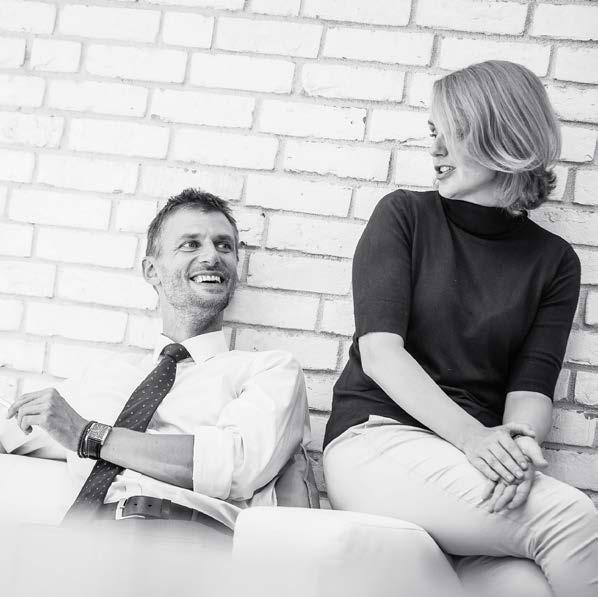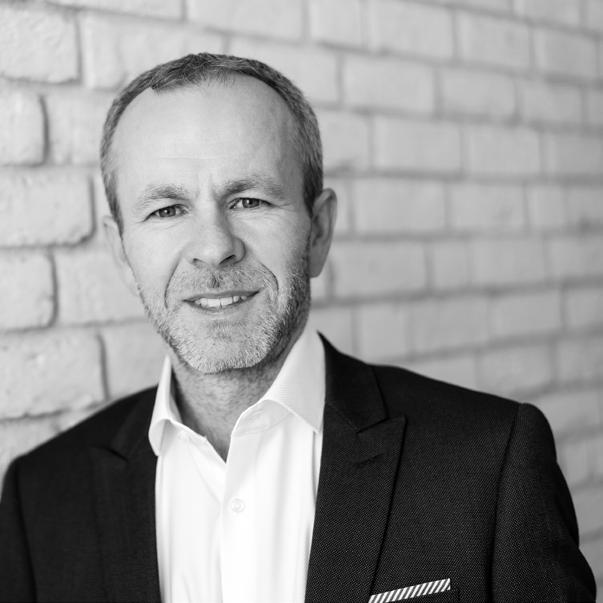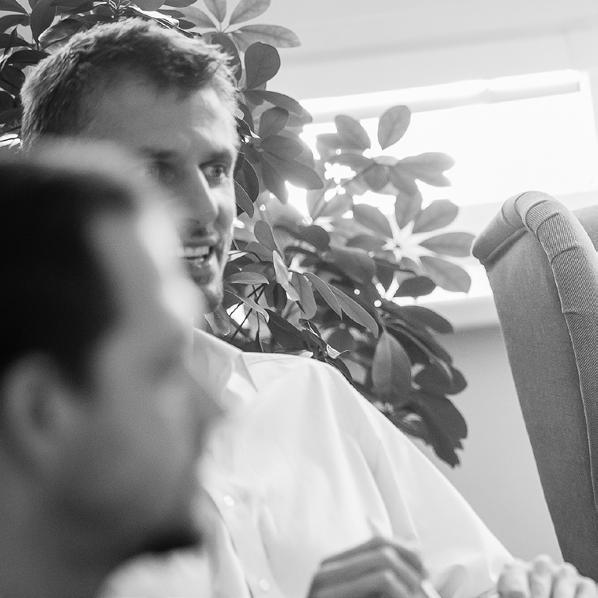Training Catalogue 2023



ABOUT US 4
OUR APPROACH 10
BLENDED LEARNING 11
TRAINING PROCESS 15
MAIN PRINCIPLES OF VIRTUAL TRAININGS 16
DEVELOPMENT PROGRAM: MANAGEMENT AND LEADERSHIP 20
MAXMAN MANAGEMENT SIMULATOR TM 22
MAXMAN MANAGERIAL ACADEMY 24 CHOOSING THE RIGHT PEOPLE 26
WELCOME TO THE WORLD OF LEADERSHIP - BUILDING AN EFFICIENT AND MOTIVATED TEAM 28 ENGAGEMENT AND RESPONSIBILITY (FOR NEW LEADERS) 30
DIFFICULT MEETINGS AND CONVERSATIONS WITH EMPLOYEES 32
PEOPLE DEVELOPMENT 34
CHAIRING MEETINGS EFFICIENTLY 36 MANAGER´S GUIDE OF CHANGE PHASES 38
REMOTE MANAGEMENT AND LEADING PEOPLE IN A HYBRID WORLD 40 MANAGER AS A MENTOR AND A COACH 42 EMPLOYEE EVALUATION INTERVIEWS 44
EFFECTIVE FEEDBACK – RADICAL CANDOR PRINCIPLE 46 LEADERSHIP STYLES 48 MOTIVATION 3.0 50
FLIGBY™ - ONLINE LEADERSHIP SIMULATION 52
ESTABLISHING MATURE CULTURE IN TEAMS/ORGANISATIONS 54
DEVELOPMENT PROGRAM: CUSTOMER CARE AND SALES 56
SALES SIMULATOR 58
EFFECTIVE CUSTOMER COMMUNICATION 60
TACTICAL SALES 62
STRATEGIC SALES 64
NEGOTIATION SKILLS 66
DESIGN THINKING 68
DEVELOPMENT PROGRAM: GENERAL PERSONAL DEVELOPMENT (SOFT SKILLS) 70
EFFECTIVE TEAM COOPERATION IN A HYBRID WORLD 72
THE BRAND CALLED ME (PERSONAL BRANDING) 74
EFFECTIVE COMMUNICATION 76
MAXMAN COMMUNICATION ACADEMY 78
FACILITATION SKILLS 80
BUILDING MENTAL STRENGTH 82
CREATIVITY – “OUT OF THE BOX” THINKING 84
NON VIOLENT COMMUNICATION 86
NON VIOLENT COMMUNICATION ACADEMY (NVC) 88
PERSUASIVE PRESENTATION 90
PRESENTATION SIMULATOR 92
CONFLICT RESOLUTION 94
STRESS MANAGEMENT AND BUILDING RESILIENCE 96
TIME MANAGEMENT AND PERSONAL EFFICIENCY 98 FACING CHANGE 100
INTERCULTURAL COMMUNICATION 104 MINDFULNESS 106 ASSERTIVE COMMUNICATION 108 EMOTIONAL INTELLIGENCE 110
STRATEGIC PERSUASION 112 GROWTH MINDSET 114 CRITICAL THINKING 116
DEVELOPMENT PROGRAM: HUMAN RESOURCES DEVELOPMENT 118
LEADING EFFECTIVE INTERVIEWS 120
TRAINING FOR ASSESSMENT AND DEVELOPMENT CENTERS ASSESSORS 122
HOW TO DEVELOP PEOPLE IN ORGANISATIONS 124 TRAIN THE TRAINERS 126
DEVELOPMENT PROGRAM: TEAM DEVELOPMENT 128 TEAMBUILDING 130 DESIGNING A NEW FUTURE 132 PERFORMANCE & POTENTIAL MEASUREMENT 134
PSYCHODIAGNOSTICS, ASSESSMENT & DEVELOPMENT CENTERS 136
TRAINERS / CONSULTANTS 138 REFERENCES 164
We are here since 1994 trying to make world better in the area of business projects as well as through volunteering. We do our work with passion and we do our best to be proud of what we do.
We specialize in development of employees, managers, and leaders. We design and realize Assessment and Development Centers, trainings, consulting, coaching, mentoring and personality analyses as well as deep analyses of organizations, processes, HR and other department including management functions.
Our clientele consists of companies based in Europe and Asia from different sectors: IT, Telco, Finance, Production, Services, FMCG, Energy, ...
In the year 2014 we started HRLeaders Conference, aimed at all HR Professionals.

We appreciate the uniqueness of every company and organization and we account for your specific educational and developmental needs.
Our goal is to deliver the most effective solutions for our clients, offering them development projects tailor-made for their needs.
a) by modifying existing Maxman Consultants development projects according to the client´s specific needs and requirements
b) by creating a completely new program/project based on consultations with the client
By using this model we guarantee the consistency of the development projects with the client´s unique corporate client, their strategy, philosophy, as well as goals.

Slovakia | Czech Republic | Austria | Hungary | Poland | Romania | Turkey | Greece | India | Georgia | United Arab Emirates | Malaysia | Kazakhstan | Sri Lanka | USA
Infoteam Sales network
Czech and Slovak association for experiential learning Performability network
International partners for assessment and development Slovak association of coaches International Coaches Federation Persona global
■ Trainings in following areas:
■ management and leadership
■ sales and customer service
■ individual development (soft skills)
■ HR development
■ team development
■ Transformation into a self-managing organization
■ Comprehensive development programs for leaders, managers, traders, talents, ...
■ Individual development tools (coaching, shadowing, mentoring)
■ Maxman Online Zone – online learning platform
■ Online assessment tools (360-degree feedback survey, customer satisfaction, etc.)
■ Team development-improving teamwork, teambuilding workshops and team facilitation intervention
■ Management meetings
■ Consulting services in the field of human resources development
■ Assessment and Development centers
■ Optimization & Diagnostic processes, increasing the performance of the company
real managerial experience of trainers (practical experience of trainers from management positions in team management in Slovakia and in the Czech Republic)
psychological „background“ of the selected trainers business experience of the selected trainers
international experience (we are proud to be a Czech & Slovak company that has implemented and is implementing development projects within seventeen European countries and Asia)
strong internal team of trainers (we do not offer or sell externals and freelance trainers) we emphasize the use of pragmatic approaches, we are focusing on developing specific skills and mastering techniques that are immediately applicable in practice
we have our own online assessment tool for measuring satisfaction and feedback (360-degree feedback survey, 90-degree feedback survey, customer satisfaction, ...)
Our goal is to make development and learning for people as effective and as colorful as possible, and to create the right conditions for all people to learn, no matter what their preferred learning style is. Therefore, we believe in development to be supported by several tools and methods, i.e. blended learning.
Prior to each training, participants will receive in their training invitation an assignment to so called pre-work. I.e. before their training they will be challenged to prepare part of the documents that they will be working with during training, or they will have to read articles or watch a video related to the subject. The goal is for the participants to be attuned to the development topic, so that during training they can concentrate more on the training of skills and techniques.
An online development tool which participants access through a web platform on their computer at work or at home. It’s an interactive real-time tutorial on a selected topic where participants can chat, ask questions, participate in polls and quizzes, share videos, files, or other multimedia content. The trainer combines classic form of training with e-learning. Although the webinar does not require physical presence at the venue, it is a very interactive form of education.
We carry out webinars in two forms:
■ prior to training: as an essential tool for gaining insight into the topic, providing theory, know-how and techniques to participants, and basic skill practice
■ after training: as a tool for group reflection on the implementation of the acquired tools, to re-iterate the trained topics and to deepen knowledge from the specific field
Usual length of the webinar is 60-90 minutes, participants connect to the online platform from their computer anywhere, and the webinar is led by Maxman Lecturer / Consultant.
In our learning courses, we focus on practical examples, using techniques and recommendations on the topic, on drilling and testing the learned skills, and on facilitated discussions and activities to support the acquisition of new the newly acquired techniques. Trainings can be carried out face-to-face or online.
At the end of each training session, participants will create their own individual action plans that they will implement between the training sessions. At the beginning of each following training session, the action plans will be discussed in the group and updated. We recommend strengthening the implementation of the learned skills also by the company management by including these action plans as part of the participants’ development plan. Also, within the performance management cycle discuss them with a direct superior who can help the team member reflect on their progress and provide them with the necessary support.
An online place where participants can discuss, share experiences and consult not only with the trainer, but also with each other. Here, they receive links to literature, websites, videos etc. The trainer visits the virtual classroom and is available to the participants at pre-arranged intervals and times. We implement virtual classrooms using MS Teams, Slack or any other external and internal platforms chosen by the client.
An online learning platform based on the Maxman Consultants´ educational concepts and long-standing know-how.
It can be used as a separate, full-featured development tool, or as a supplement to classic face-to face trainings, or online trainings.
Maxman Online Zone offers video tutorials through which participants learn managerial, business or team skills.
Within the online zone, it is also possible to complete basic psychodiagnostic assessments (get to know your personality preferences, strengths and weaknesses).
With selected groups and selected topics, development can be complemented by individual meetings with the trainer. These meetings are focused on coaching and consulting, or on shadowing the participant directly during their performance at work (e.g. conducting meetings, presentation skills, meetings / calls with clients etc.)
To help the participants develop the habit to use the learned skills after each development activity, we re-administer the 90 °, 180° or 360° online feedback (at short intervals of 6 to 12 weeks).
Participants receive regular anonymous feedback from their subordinates on how effectively they use the skills they have learned in training. This mild “psychological pressure” leads participants to endure in applying these new skills for a longer time as they gradually form their new habits. The use of online feedback enhances the positive effect of individual training. Maxman’s online platform is available to design the online feedback based on the client’s needs and requirements.
Tips, techniques, recommendations
Short theoretical input
Discussion and feedback
Practice, exercising
In our trainings, we place great emphasis on practice and hands-on training of individual techniques and situations, as well as subsequent analysis and feedback.
Participants can immediately test and experience the techniques introduced and demonstrated by the trainer. Subsequently, based on targeted feedback, the participants can adjust and improve their performance in real time.
The ratio of theory : real exercise/role plays/simulations is about 20% : 80% in favour of the practical activities and simulations.
We offer you a full educational experience from the comfort of your home or office.
For virtual trainings, we use a combination of video-calls, online assignments, case studies, interactive presentations, video demonstrations, online chat, digital quizzes, as well as interactive online canvases to share sketches and ideas.
We work with a group of up to 9 participants to enhance and maintain interactivity and engagement.
Participants receive a link to the virtual room by e-mail along with login details. Participants need to have an internet connection and a functional camera on their computer. After clicking on the link, they will be welcomed in the virtual room by the instructor who will accompany them during the training. Upon completion of the training, participants receive training

Role plays One to one role plays. Group role plays.
Demonstrations of specific skills / specific situations.
Case studies
Managerial case studies - individual or group solutions.
Group activities
Group problem solving illustrating the discussed subject
Short theoretical inputs
Short “how to” instructions. Brief theoretical summaries of the skills demonstrated and exercised.
The trainer facilitates every discussion so that all participants get involved in the learning process..
Group feedback (the whole group provides feedback to participants involved in particular activities) + feedback from the trainer to the group. Individual feedback + feedback from the trainer to respective participants after their performance.
The use of training facilities for our clients is included in the price of the training day.
During our trainings in the Maxman Training centre, we offer refreshments (water with lemon slices, tea –loose leaf and teabags, quality coffee, fruits, sweet and savoury biscuits and snacks). The quality of our snacks is important to us, so we make sure that they are healthy, tasty and fresh. Refreshments in the described extent are available throughout the entire training day.
We believe that the training starts with the first contact of the participant with the trainer. That is why our trainers send an invitation with a brief description of the content, the benefits of the training, and basic organizational instructions to the contact person on the client´s side (usually the assigning manager or HR specialist). The contact person on the client´s side then forwards the invitation to the participants.
After each training, the trainer sends so-called training notes to the participants. These include the feedback, useful links, and other summaries. The information serves to verify the merits and benefits of the training for the participants and supports practical implementation.
We believe that our fast-paced times require us to look for tools to help participants anchor the knowledge and ideas acquired through the training sessions. After each training, the participants receive a brief, but content-strong training material with a summary of the training´s most important ideas.

Individual development program based on simulations of real (difficult) managerial situations. Manager (participant) works with a real team throughout the simulator (people in the team are specially prepared to create requested situations, reactions, characters).
The content is always tailor made to the needs and current level of managerial skills of particular participant (manager). The program can be designed for wide range of situations; each simulator is designed for 1 participant.
Key topics included in Management Simulator:
■ faces the real situations
■ decides and takes responsibility
■ leads a team
■ presents thoughts, projects, results
■ has individual and group meetings
■ solves conflicts and difficult situations
■ is responsible for his time management throughout the day
■ gets the feedback after each activity (reactions and behaviour are evaluated by trainers)
■ gets information on appropriate techniques and managerial tools that can be used in particular situations, tips & tricks how to improve in particular skills
Target group line, middle, top managers / talents
Training methodology
simulations, facilitated discussions, role plays and targeted feedback proportion of theory and practice: 20/80
Recommended training duration 1 day
Maximum number of participants per group 1 participant
6 modules:
■ Basic Manager´s Mindset
■ Managerial Psychology
■ Performance Management - Priorities / Directions / Objectives
■ Radical Candor + how to work with feedback
■ Manager as a mentor and coach
■ Manager as a facilitator
Target group managers
Form of the training
Training methodology
six 2.5-hour online interactive workshops (regularly every two weeks). videos and developmental inspirations micro-tasks
short theoretical inputs, practice of new techniques, simulations, facilitated discussions, role plays. ratio between theory and practical training: 20:80
Maximum number of participants per group 12 participants
A training aimed at improving managers´ recruitment skills. We offer simple and effective tips and techniques for managers, HOW and WHAT to ask the candidate in order to find out if he/she is right for them. We openly talk about the possible mistakes and the pitfalls of the interview process, as well as about ways of saving time. After our training, the participants have the knowledge and tools to conduct effective selection interviews, ask relevant questions that stimulate relevant answers from the candidates, as well as have a professional approach towards the candidates.
■ Who am I looking for? Who is the right candidate for me? Where and how to look for candidates?
■ analyzing CVs and first preselection
■ preparation for an interview
■ interview structure
■ STAR interview methodology (behavioral interviewing)
■ processing results, evaluating of the interview and the candidate
■ communication with the candidate and employer branding
Target group managers
Training methodology
short theoretical inputs, practice of techniques, simulations, facilitated discussions, role plays proportion of theory and practice: 30/70
Recommended training duration 1 day
Maximum number of participants per group 9 participants
Development program for managers focused on understanding and mastering a wide range of basic management techniques and tools. It covers the entire performance management cycle: from planning and assigning goals and tasks, through monitoring, boosting motivation, providing employee support, to performance evaluation. Participants will learn how to manage their team’s performance effectively so that both the organization and employees are satisfied. We always tailor the training - its content and scope - to the needs of a particular client.
■ manager’s role
■ managerial psychology and effective communication
■ setting goals and tasks
■ performance monitoring (the how and how often), performance evaluation
■ regular feedback, building a culture of feedback in the team
■ motivation and support of team members
■ regular meetings with employees
■ development meetings and development plans
Target group managers
Training methodology
short theoretical inputs, practice of techniques, simulations, facilitated discussions, role plays proportion of theory and practice: 20/80
Recommended training duration 1-2 days
Maximum number of participants per group 12 participants
Development program focused on setting a development plan as well as on activities supporting the engagement and ownership of participants within the company and within the requirements that are placed on them in the role of managers. An important part of the training is also the globally recognized scientific concept FLOW, whose author was a leading representative of positive psychology Prof. M. Csíkszentmihályi. The ability to evoke state of flow in the team and in its individual members is a key prerequisite for good leadership and an essential element of sustainable productivity in business.
Key topics:
■ what helps you in your personal and professional development?
■ effective development mix: Principle 70-20-10
■ learning styles
■ engagement - what it means, what are the basic pillars on which engagement stands
■ engagement and the Flow concept
■ integrity and moral conduct
■ specific situations from practice, which are mainly focused on taking responsibility: whether for individual or team results, the ability to admit a mistake and take responsibility for it
■ what does “learned helplessness” mean (especially in a large corporate) and how to deal with it
Target group managers / leaders
Training methodology
short theoretical inputs, practice of techniques, simulations, facilitated discussions, role plays proportion of theory and practice: 30/70
Recommended training duration 2 days
Maximum number of participants per group 12 participants
This training is designed for leaders, managers and all those who manage teams. The situation that has been happening in Slovakia and around the world for the last few years is unexpected and no one is fully prepared for it. In addition to fundamental changes in our private lives and ways of working, it also brings about a sharp change in the economy and business - our settings, our work system, processes, forms of communication and cooperation, our ability to plan change. The pressure on managers’ shoulders is even higher, as every change needs to be communicated to their team members. We provide practical recommendations, tips and principles on how to communicate effectively, in partnership and empathically with team members - whether on an individual or team level - in this exceptional situation.
Key topics:
■ stress and panic during changes
■ adult communication
■ empathy
■ choosing the right approach
■ people in my team
■ announcing of negative messages
Target group managers / leaders
Training methodology
short theoretical inputs, practice of techniques, simulations, facilitated discussions, role plays proportion of theory and practice: 30/70
Recommended training duration 1 day
Maximum number of participants per group 12 participants
A training aimed at improving knowledge and skills in the area of self development and people development. During the training, participants acquire practical tools and tips on how to correctly identify development needs, how to plan optimal development for themself and others, what development tools can be used and what their effects are.
Key topics:
■ employee development as part of performance management
■ the principles of development and education and their application in practice (learning styles, the Kolb cycle)
■ 70/20/10 – an effective developmental combination
■ how to develop yourself and others without a “budget“
■ how to correctly identify developmental needs
■ dialogue with an employee about development
■ development tools:
■ self-reflection
■ feedback ■ coaching
■ mentoring
■ shadowing
■ buddy system
■ on the job development tools
■ an effective development plan (Development roadmap)
Target group managers
Training methodology
short theoretical inputs, practice of techniques, simulations, facilitated discussions, role plays proportion of theory and practice: 30/70
Recommended training duration 1-2 days
Maximum number of participants per group 10 participants
An interactive training for those who want to get the most from the meetings they chairby achieving clearly defined meeting outcomes, maximising participant contributions and overcoming meeting challenges. Participants should learn about the roles and expectations within effective meetings, establishing the best structure for conducting their meetings and the tools available to achieve the meeting outcomes. The training also covers the development of skills and techniques leading to more effective managing of group dynamics in a virtual environment - in online meetings. Participants will learn to manage the specifics of online meetings, reduce online fatigue and conduct online discussions effectively.
■ planning the meeting
■ key success criteria
■ agenda of the meeting
■ participants, room, time, roles
■ structure of a meeting
■ how to boost discussion
■ how to decrease excessive activity
■ handling difficult participants
■ managing conflicts
Target group managers / project managers
Training methodology
short theoretical inputs, practice of techniques, simulations, facilitated discussions, role plays proportion of theory and practice: 30/70
Recommended training duration 1-2 days
Maximum number of participants per group 9 participants
A program based on the 8-step change management process by J.P.Kotter. During the program, participants will be guided through each phase of implementing change. For each phase, they will be provided with the skills / tools to successfully implement that phase.
■ change as a process
■ 8 steps of change management
■ creating urgency
■ forming coalitions
■ creating a vision for the future
■ communicating the vision and getting a „buy in“
■ empowerment
■ short-term wins
■ resistance management
■ anchoring the changes
Target group managers / leaders
Training methodology
short theoretical inputs, practice of techniques, simulations, facilitated discussions, role plays proportion of theory and practice: 30/70
Recommended training duration 2 days
Maximum number of participants per group 12 participants
A development program designed for managers who lead people working in hybrid conditions. The training is focused on the specifics of “remote” performance management, planning and evaluation of results, as well as the transformation of basic management tools - setting goals, providing feedback, providing support and coordinating the development of a team whose members are not readily available in the office. Participants will understand the specifics of hybrid communication and will be able to adapt their style to increase effectiveness as well as as the overall collaboration within their hybrid teams.
Key topics:
■ challenges and specifics of hybrid work
■ psychology of remote work, online communication
■ trust and cooperation, how to build and maintain them in hybrid conditions
■ effective use of synchronous and asynchronous communication
■ communication tools and techniques
■ clarification of roles, rules and responsibilities in hybrid teams
■ managerial skills that have become key in the hybrid world
Target group managers / leaders
Training methodology
short theoretical inputs, practice of techniques, simulations, facilitated discussions, role plays proportion of theory and practice: 30/70
Recommended training duration 1 - 2 days
Maximum number of participants per group 12 participants
Mentoring and coaching are two very effective tools of individual and team development of subordinates. Both should be applied by managers in their work. The goal of the programme is not to turn managers into qualified, full-time coaches and mentors, but rather to teach them how to apply elements of both approaches in their work.
When the manager is a mentor, he/she develops his protégés by passing on his knowledge and experience, by creating opportunities for career growth. The activity is primarily on the side of the mentor, the approach is more direct, sometimes directive „Do it this way, because, ... don´t do it that way, because...“
When the manager is a coach, he/she develops the protégé mainly by asking the proper questions, so that they find the solutions by themself. Most of the activity is on the side of the protégé, the approach is more undirective. “What will happen if you keep doing it this way…? What will happen if you change it so that …?
Key topics:
■ coaching and mentoring competences
■ the process of mentoring and coaching
■ the process of experiential learning in mentoring
■ coaching with immediate effect
■ mentor and Coach manual
■ learning partners
■ a mentor´s work on their own development
Target group managers
Training methodology experiential training proportion of theory and practice: 10/90
Recommended training duration 2 days + 5 individual meetings
Maximum number of participants per group 12 participants
The aim of the training is to help participants learn how to conduct employee evaluation interviews more effectively by practicing real situations from the participant´s real life and by receiving feedback from the lecturer. The training is based on practical exercise of giving and receiving feedback and performing employee assesments.
Key topics:
■ preparing yourself and your employee for a meaningful conversation
■ preparing the structure of the interview
■ conducting an employee evaluation interview and setting its criteria
■ principles of feedback
■ avoiding basic mistakes in conducting evaluation interviews
Target group managers
Training methodology short theoretical inputs, training of new techniques, simulation, facilitated discussion, role plays proportion of theory and practice: 30/70
Recommended training duration 1 day
Maximum number of participants per group 12 participants
This interactive training introduces participants to the concept of Radical Candor, which author Kim Scott used in her managerial practice. The training consists of explaining concepts and using tools to translate the concepts the author mentions into practice. At the same time, participants have the opportunity to bring forth their own experience and try the techniques directly on them. They leave not only with an idea of the principles, but also with concrete, applicable action steps.
■ creating a manager’s space / role
■ sharing feedback experiences
■ stories of Radical Candor
■ what to avoid vs how to do it right
■ Radical Candor management cycle
■ distribution of employees according to the growth trajectory and according to the results
■ setting up team meetings to open up Radical Candor
Target group managers / leaders
Training methodology
short theoretical inputs, practice of techniques, simulations, facilitated discussion, role plays proportion of theory and practice: 30/70
Recommended training duration 1 - 2 days
Maximum number of participants per group 12 participants
The development program can be set up as a basic overview of the leadership styles that managers use in their work. The concept is based on 6 leadership styles according to David Goleman: pacesetting, commanding, visionary, affiliative, democratic and coaching.
An extension of this program are one-day trainings - each training focused on a more detailed understanding of the selected style.
■ overview of the 6 leadership styles according to D. Goleman
■ participants will understand their preferred way of managing and realize which styles they do not make full use of and could potentially improve
■ a basic overview of the management tools that are appropriate for each style.
■ Coaching approach: for those who need their subordinates to handle increasingly demanding tasks, in this training managers learn to be able to transfer more responsibilities to them and to be more independent
■ Visionary approach: for those who need to get people’s buy in on ideas, thoughts, projects or tasks, in this training managers learnto achieve higher motivation and engagement.
■ Affiliative style: for those who needto create space in the team for effective cooperation and support their subordinates in taking ownership, strengthening proactivity. In this training managers learn to increase people’s interest and involvement.
Target group managers
Training methodology
short theoretical inputs, training of new techniques, simulation, facilitated discussion, role plays proportion of theory and practice: 30/70
Recommended training duration 1 - 5 days
Maximum number of participants per group 12 participants
There are many theories and publications about how to best motivate the employees to work well. Our training, however, is not focused on various theories of motivation; quite on the contrary, we stick to pragmatic and realistic situations and behaviours. We follow the rule – let´s first teach people to stop demotivating their employees, and only then let´s add motivation techniques and strategies. We, therefore, go through the specific experience with the participants to create strategies for implementing the desired changes into the real working process.
■ what demotivates people
■ identifying demotivating behaviour
■ which behaviors of the manager have a negative impact on the performance of individuals and the entire team
■ creation of action plans
■ different types of people are motivated by different drivers. The key to managerial success is the correct identification of drivers for individual team members
Target group managers
Training methodology short theoretical inputs, training of new techniques, simulation, facilitated discussion, role plays proportion of theory and practice: 30/70
Recommended training duration 1 day
Maximum number of participants per group 12 participants
Enter the future of blended learning & personal development. FLIGBY™ is an ONLINE LEADERSHIP SIMULATION that develops leaders and future leaders and teaches them how to create highly committed, high-performing teams. It brings a gamified approach to the development of managerial competencies based on the globally recognized scientific concept of FLOW, whose author is a prominent representative of positive psychology – prof. M. Csíkszentmihályi.
FLIGBY is a combination of an online simulation video game with an educational program as well as a competence assessment based on international benchmarks. The main part of the program is the FLIGBY game, which measures 29 managerial competencies, gives the players a very open, continuous feedback from a virtual mentor, and at the end, offers them a comprehensive management profile based on each player’s measured competencies.
■ in the game, the participant becomes the newly appointed General Manager of a company, where he manages an 8-member management team. The goal is to turn a company with a highly demotivated team into a high-performance, financially successful company that is also an optimal working environment. The game measures financial impacts of the player’s individual decisions and impact of the decisions on the level of the team members’ motivation
■ the player should strive to pull members of the virtual team from a state of apathy, frustration, and anxiety by making the right managerial decisions and gradually bring them into a state of Flow, thereby greatly improving their performance
■ the participant takes decisions in 23 scenes and is exposed to a number of situations that are key to mastering the competencies of a great leader: shaping strategy, resolving conflict situations, defining priorities, providing feedback, deciding on a host of regular managerial dilemmas and daily challenges
■ after completing FLIGBY, the player receives a comprehensive individual report, in which 29 different competencies demonstrated throughout the game are evaluated. It is followed by 1-day meeting of the participants. A common, shared interpretation of the key moments and concepts that participants experienced during the FLIGBY simulation, identifying parallels with their work reality, and finding possible solutions for the future (tips, techniques and recommendations led by one of our trainer/consultant)
Training methodology
Recommended training duration
Interactive simulation videogame, short theoretical inputs, practice of techniques, simulations, facilitated discussions, role plays during workshops
Initial workshop 0,5 days
FLIGBY online simulation 5-8 hours
Follow up workshop 1 day
Maximum number of participants per group 12 participants
Companies are driven forward by passionate, involved and independent people. In the development programme you can learn how to introduce the culture of high independence and self-management into teams (from small, actively-managed companies to teams in big corporations), how to work with the principles of more freedom and trust without causing anarchy. You will be given techniques, principles and specific activities that will help you gradually implement the elements of self-management into your teams.
Key topics:
■ basic principles necessary for introducing self-management into teams
■ pillars of participatory co-management
■ seven levels of decision making
■ practical tools to be used in teams when moving to self-management
■ examples and case studies
Target group managers and leaders
Training methodology examples and case studies, facilitated discussions, best practice sharing, experimentation with specific tools + feedback
Recommended training duration 0,5 day
Maximum number of participants per group 10 participants

It is an intensive individual development program that is suitable for all levels of traders. The program can be precisely tailored according to the development needs of the given participant. Individual development program based on simulations of real (difficult) business situations.
Sales simulator is aimed at practicing all situations that happen during the sales process with the client. Theparticipant will be exposed to the following situations:
■ meeting with the client - new / existing
■ determining needs
■ proposals for solutions - presentation
■ argumentation - negotiation of conditions
■ closing the sale
■ coping with difficult situations
Development goals:
■ setting up a mirror for the salesman on his used sales techniques
■ feedback on handling difficult situations
■ repeated practice of identified key skills
■ expanding the portfolio of business skills
■ acquiring the ability to react correctly in critical situations
Target group sales persons, sales managers, KAM
Training methodology
short theoretical inputs, new skills practice, simulations, facilitated discussions, role plays proportion of theory and practice: 30/70
Recommended training duration 1 day
Maximum number of participants per group 1 participant
The training is focused on understanding the importance of customer orientation and it also introduces the participants to specific, effective methods of communication with customers. Understanding the customers’ needs and being able to respond to them adequately makes a customer become a satisfied customer whether the participants work with internal or external customers. The training offers practical and simple tips on how to identify needs and increase satisfaction of the customer throughout the communication process.
■ identifying needs and expectations
■ asking questions and active listening
■ customer orientation principles
■ types of customers and how to communicate with them
■ social styles (basic typology, strengths and weaknesses of each type; specifics of work, thinking and communication of individual types)
■ dealing in difficult situations
■ main deescalation tactics and their application in practise
Target group managers / employees
Training methodology
short theoretical inputs, new skills practice, simulations, facilitated discussions, role plays proportion of theory and practice: 30/70
Recommended training duration 1 day
Maximum number of participants per group 12 participants
In the development program, participants gradually go through the six phases of the sales cycle (in each phase, on one hand, they become aware of their strengths and areas in need of development, on the other hand, they gain tools, techniques and skills to increase their performance in a given phase of the sales cycle).
■ Building and sustaining relationships, creating rapport, adapting the salesman’s style and communication with the personality of a business partner
■ Needs analysis (ability to identify apparent and subliminal expectations)
■ Finding / creating solutions (involving the client in co-creating the solution) „features vs. benefits” focus
■ Communication with the client in relation to the competition
■ Dealing with difficult situations / objections / uncertainties on the client’s side
■ “Closing” techniques
Target group sales managers, KAM, sales representatives
Training methodology
short theoretical inputs, practise of new techniques, simulations, facilitated discussions, role plays. ratio between theory and practical training: 20:80
Recommended training duration 2 days
Maximum number of participants per group 12 participants
In the strategic sales training, we focus on all the important steps that are vital for effective business case management. Participants learn what needs to be done before the first contact with the client. They gain tools to prioritize business opportunities as well as analyze the potential of individual clients. They learn to gradually implement the tools by creating an “opportunity road map” and learn to strategically approach sales so that they can maximize the effect of their effort and time.
Key topics:
■ Evaluating opportunities
■ Analyses of a shopping center
■ An analysis of corporate and personal needs
■ Identification of our position at the customer
■ Qualified GO / NO GO decisions
■ Creation of specific action plans
Target group sales managers, KAM, sales representatives
Training methodology
short theoretical inputs, practise of new techniques, simulations, facilitated discussions, role plays. ratio between theory and practical training: 20:80
Recommended training duration 2 days
Maximum number of participants per group 12 participants
The main focus of the training is the professionalization of participants in negotiation and negotiation meetings, whether it be with external or internal partners (colleagues, suppliers, customers, unions, ...).
Participants learn how to prepare for a negotiation, how to choose the appropriate strategy and they acquire the skills and information necessary for achieving success in business and nonbusiness negotiation processes.
■ negotiation strategies and tactics
■ preparation for professional negotiation with external and internal partners
■ use of individual bargaining techniques
■ techniques on how to close a sale/purchase without any unnecessary delay
■ addressing objections and the principles of processing rejection and resistance from the partner
■ using simple personal typology when dealing with a partner
Target group managers / sales persons / buyers
Training methodology
short theoretical inputs, training of new techniques, simulations, facilitated discussions, role plays, video recording followed by instant feedback
Recommended training duration 1 - 2 days
Maximum number of participants per group 6 - 12 participants
The aim of this workshop is to get acquainted with and experience the five phases of Design Thinking on a specific project. It is an agile, participatory and creative method of solving customer centered challenges in the form of an end product or service. During the two days of the workshop, participants will be deeply involved in defining the project together, identifying customer needs (including internal ones), creating, prototyping and testing a product or service. After completing the workshop, participants will gain an understanding in the Design Thinking method and will be able to use it as a whole or partially when solving their own customer challenges. We select the practice project for the workshop from the contributions of the participants. In the phases where interaction with a real end user is required, we contact fellow participants and find out their needs and customer preferences.
Key topics:
■ 5 steps of the Design Thinking method
■ understanding customer needs
■ participatory creation from the idea to a prototype
■ quick hypotheses verification in iterations
Target group managers / employees
Training methodology
short theoretical inputs, workshop on simulated or real example, facilitated discussions, brainstorming, debrief and feedback, proportion of theory and practice: 20/80
Recommended training duration 2 days
Maximum number of participants per group 6 - 12 participants
Development programs

Effective team collaboration still relies on known principles, but new ways of collaborating also require new skills and procedures that not only managers but also teams have not yet become accustomed to. During the training, participants will learn more about the psychology of the “remote” world, which attitudes are important to change to achieve full-fledged collaboration in the online world, how to overcome the pitfalls of home office and hybrid work and concrete steps to transform a team from office to hybrid. An important part of the training will also be psychohygiene, the validity of which has come to the fore today more then ever.
Key topics:
■ psychology of the “remote” world
■ change of fixed attitudes
■ support for effective cooperation within the team
■ psychohygiene and mental health
■ home office traps
■ steps of team transformation to the “new normal”
Target group compact team
Training methodology
short theoretical inputs, practice of techniques, simulations, facilitated discussions, role plays proportion of theory and practice: 30/70
Recommended training duration 1 day
Maximum number of participants per group 12 participants (for 1 consultant)
Every person is a brand whether we are aware of it or not; whether they make a conscious effort to develop it or they just let their brand have its own life. A personal brand means reputation, and impression we make on other people. The better we are in developing our own brand (inside the company or on the outside), the better our chances to influence what happens around us and assert our ideas, thoughts and projects. Developing the brand called „ME“ has its principles and rules.
Participants of this training will learn techniques and procedures of personal branding and will explore how to increase the value and impact of their own brand with relatively small time investment.
Key topics:
■ personal branding – overall concept and structure of basic questions
■ target group analysis
■ personal added value analysis
■ positioning
■ advantages / disadvantages of individual communication channels
■ creating individual maps of personal branding
Target group
Training methodology
the training can be tailored to a wide range of participants – from long tail employees to top management
short theoretical inputs, tips, tricks and techniques participants will apply to their situation in the training at the end of training, each participant will have his or her own map of personal branding
Recommended training duration 1 day
Maximum number of participants per group 12 participants
In some situations, one incorrectly chosen articulation can cause incalculable damage. The Effective Communication development program focuses on training communication techniques in a level environment within a company, effective circulation of information, understanding colleagues, and acquiring professional communication techniques. With Effective Communication i tis easier to handle and maintain positive relationships, delegation, goal setting, influencing, as well as conflict prevention and resolution.
Key topics:
■ principles and rules of effective and efficient communication
■ communication techniques / tips and recommendations
■ typology of communication partners
■ active listening
■ clarity, precision, and confidence in communication
■ persuasion
■ communication crises
■ personal, mail, telephone communication and their specifics
■ feedback as an effective tool for effective communication
Target group employees / managers
Training methodology
short theoretical inputs, practice of techniques, simulations, facilitated discussions, role plays proportion of theory and practice: 30/70
Recommended training duration 1 - 2 days
Maximum number of participants per group 10 participants
Development of all key communication skills in an effective form, taking into account the time possibilities of the participants. The most effective communication development with the highest added value and flexible time investment on the part of the participants.
A series of six interactive modules, where the focus will be on: communication psychology, active listening, asking good questions, presenting, storytelling, persuasion and influencing, principles of assertive behavior, networking and personal branding.
Target group anyone Training methodology
short theoretical inputs, practice of techniques, simulations, self-reflection, facilitated discussions, role plays
proportion of theory and practice: 30/70
Form of the training
six 2.5-hour online interactive workshops (regularly once every two weeks. videos and development inspirations micro tasks
Maximum number of participants per group 12 participants
An interactive program aimed at understanding and acquiring skills and techniques necessary for effective work with group dynamics. Participants learn to professionally lead group discussions and meetings, manage challenging situations and work with resistance and difficult participants.
■ group dynamics
■ setting the structure and format of a meeting
■ tools for various types of facilitation purposes
■ techniques and approaches for work with a group dynamic
■ learning how to work with difficult/demanding participants
■ preventing inefficiencies and conflict situations
Target group managers / project managers
Training methodology
short theoretical inputs, simulation of facilitations and challenging situations, role plays, feedback proportion of theory and practice: 30/70
Recommended training duration 1 - 2 days
Maximum number of participants per group 9 participants
The aim of this training is to help participants identify stressors and learn to manage stressful situations more effectively. During the training, we focus on recognizing the triggers of negative emotions in ourselves and in our surroundings, eliminating the negative effects of difficult situations and tools for building mental resilience.
■ development of resilience, which is necessary in difficult times
■ examples and inspirations from crisis management in business and sports
■ self-reflection as a prerequisite for a healthy “self-consciousness” - How to build a realistic image of yourself
■ analysis of nuclear beliefs about oneself, self-criticism vs. self-acceptance, search and awareness of your strengths and reserves
■ mental training: Mental ABC - Changing negative beliefs and attitudes that reduce employee resilience
■ sssertive minimum as a tool and aid for better stress management.
■ self-efficacy as a basis for mental resilience at work in achieving goals
Target group managers / employees
Training methodology
short theoretical inputs, practice of techniques, simulations, facilitated discussions, role plays, feedback proportion of theory and practice: 30/70
Recommended training duration 2 days
Maximum number of participants per group 12 participants
In this training participants have the opportunity to get to know and understand their specific style and approach to creativity and the creation of new ideas. They also get to understand the benefits of their style, but also the benefits of other people’s styles and attitudes. During the training, participants learn techniques for generating new ideas and thoughts, the principles of “out of box” thinking, and they develop ways to critically assess ideas and suggestions. An equally important part of the training is a block in which participants learn how to properly “facilitate” creativity in their team and, conversely, what can “kill” creativity - the things they should avoid doing.
Key topics:
■ principles of creating ideas, proposals, projects
■ specifics of participant’s own approach to creativity and the generation of new ideas
■ visual facilitation of creativity in the online space
■ brainwriting, reverse brainstorming, walkstorming
■ a drill of creative techniques
■ developing creativity from an idea to implementation
Target group managers / employees
Training methodology
short theoretical inputs, practice of techniques, simulations, facilitated discussions, role plays, feedback proportion of theory and practice: 30/70
Recommended training duration 2 days
Maximum number of participants per group 12 participants
The aim of the training is for the participants to explore, apprehend and retain specific methods and principles of communication in order to promote mutual understanding and efficient communication between and throughout different levels of organization.
Initial 2 day training session – focusing on establishing common understanding of the methods, techniques and approaches of NVC, in depth practice of the techniques on role model and reallife situations and facilitated discussions about application of NVC at the workplace.
■ clear communication without accusation and critique
■ understanding and empathy
■ listening to what others are actually saying
■ managing difficult relationship dynamics effectively and in a friendly atmosphere
■ accepting “tough” comments from others
■ how to say “no” clearly and without offending the other party
■ conflict and problem prevention
■ how to inspire others to a willing and joyful collaboration
Target group managers / employees
Training methodology
short theoretical inputs, practice of techniques, simulations, self-reflection, facilitated discussions, role plays proportion of theory and practice: 30/70
Recommended training duration 1 - 2 days
Maximum number of participants per group 12 participants
Introduction to Non-violent communication and conflict resolution skills in an effective way, taking into account the time available for the participants.
The most effective development of communication skills with the highest added value and flexible time investment on the part of the participants.
5 modules:
■ how to get from conflict to understanding
■ how to make sincere and empathetic demands
■ how to listen and really hear
■ how to say no
■ how to mediate conflicts
Target group anyone Training methodology
short theoretical inputs, practice of techniques, simulations, self-reflection, facilitated discussions, role plays proportion of theory and practice: 30/70
Form of the training
five 2.5-hour online interactive workshops (regularly once every two weeks. videos and development inspirations micro tasks
Maximum number of participants per group 12 participants
This interactive training is focused on exercise and learning the principles and techniques of professional presentation. During the training, we focus on developing skills in the areas of content and structure of the presentation, form and visual aspects of the presentation and the verbal/nonverbal features of the delivery itself – all with the aim of teaching the participants to present clearly and convincingly. During the training, the lecturer works with modern theories and the newest trends in the field of developing presentation skills. One of them, for example, being simple and effective presentation of business data and complex information (outputs, reports, data, numbers, charts, tables).
■ principles of professional presentation
■ types of presentation by goal (informative, marketing, data, etc.)
■ content, scope, and structure of a convincing presentation
■ presentation form (visualisation, design, graphic processing)
■ presenting business data and complex information (outputs, reports, data, numbers, charts, tables)
■ realization of the presentation itself
■ working with the audience (personalization of the presentation, interaction with the audience and leading discussions, working with questions, etc.)
■ working with presentation tools (PowerPoint, presentation mode, working with a flipchart, etc.)
Target group managers / project managers /all those who need to present convincingly
Training methodology
short theoretical inputs, practical training for presentation and realization of the presentation video feedback proportion of theory and practice: 20/80
Recommended training duration 1 - 3 days (depending on the needs and focus of the training)
Maximum number of participants per group 9 participants
It is an intensive individual development program that is suitable for all those for whom the creation of presentations and presenting them to an audience is an essential part of their work. The program can be tailored exactly according to the development needs of the given participant.
The trainer accompanies the participant the whole time, provides him with feedback and development recommendations, in cooperation with a trained team of people who play different roles in the presentation simulator (stakeholders, managers, sales people) so that all important situations are covered during the simulations and all essential model situations created.
During Presentation Simulator the participant will be exposed to the following situations (the specific composition of activities is tailor-made, according to the defined development needs of the specific participant):
■ present in front of the group
■ answer audience questions
■ cope with difficult situations arising during presentations
■ he is responsible for his time management throughout the day and during presentations
■ in short introductions, he acquires appropriate communication and presentation techniques, which he then immediately processes and uses
Target group anyone
Simulator methodology
simulations, facilitated discussions, role plays and targeted feedback proportion of theory and practice: 20/80
Recommended simulator duration 1 day
Maximum number of participants per group 1 participant
An interactive course focused on the understanding of the reasons for conflicts and ways to prevent these reasons. Participants will learn to use a diplomatic approach to communication, manage verbal aggression, irony and sarcasm. The training is designed to demonstrate and teach correct conflict management principles, it is designed to help participants to manage any conflict situation in a clear, rational, assertive, and nonaggressive manner.
The training is built on practical rehearsing of particular professional techniques and correction of the possible barriers. The participants have the unique chance to mirror their skills, evaluate their current level and improve their skills in preventing conflicts or resolution of conflicts.
Key topics:
■ how to prevent conflicts
■ types of verbal behavior
■ assertive communication
■ manipulation
■ resolution of a conflict – basic steps
■ feedback
Target group managers / employees
Training methodology
short theoretical inputs, practice of techniques, simulations, self-reflection, facilitated discussions, role plays proportion of theory and practice: 30/70
Recommended training duration 1-2 days
Maximum number of participants per group 12 participants
The aim of the training is to help participants identify stressors and teach them to effectively manage their current stressful situations. During the training, we focus on recognizing stress triggers, eliminating the negative effects of stressful situations and identifying effective responses to individual situations. Participants will have the opportunity to pause the speed of today, realize their strengths and learn to use them to their advantage. A part of the topics covered is also work-life balance of individual participants due to the increased psychological burden resulting from the consequences of past events in the world and changes in the organization of their work and private life.
■ identification of stress and stressors at work
■ how to solve stressful situations, elimination of negative impacts
■ basics of assertive communication
■ how to prevent stress
■ self-organization – how to manage their own time
■ delegating the tasks – yes or no and when?
■ real life examples, group solutions of particular situations, case studies
Target group managers / employees
Training methodology
short theoretical inputs, practice of techniques, simulations, self-reflection, facilitated discussions, role plays proportion of theory and practice: 30/70
Recommended training duration 1-2 days
Maximum number of participants per group 12 participants
One day course how to manage time effectively, how to work optimally with tasks, goals, projects. Participants will learn how to prioritize, differentiate the importance of particular tasks, cooperate better with others in order to manage time effectively, how to organize their work.
Key topics:
■ main principles of personal efficiency and time management. Basic tools.
■ prioritization of tasks (time and content perspective), tips and tricks.
■ eisenhower’s window, GTD technique.
■ working with technologies as a way how to increase personal efficiency.
■ planning – process of planning in simple steps.
■ time consuming activities – identification and how to eliminate them.
■ main principles how to create right habits
Target group managers / all those who want to work more efficiently
Training methodology
brief theoretical summaries of the skills demonstrated and exercised, interactive discussion and feedback strengthen the application of learned into practice proportion of theory and practice: 30/70
Recommended training duration 1 day
Maximum number of participants per group 12 participants
This training is based on KAI - Kirton Adaption Innovation Inventory and a deep understanding of personal differences in the perception of change from the perspective of the individual. Participants learn tounderstand the benefits of diversity in their teams and their network. Prior to the training, participants are be given the access to our Maxman Online Zone, where they complete a Problem Solving Questionnaire, the results of which they work on during the training.
■ KAI diagnostics - personal and cognitive differences between different types of people and the impact of these differences on the perception and management of change
■ me - understanding one’s own personality style
■ people in my team - recommendations for work, communication and management of people in the team based on personality differences
■ my surroundings – gaining understanding of personality specifics in communication and cooperation with superiors, colleagues, internal or external clients.
■ synergy - using the diversity and strengths of each type to achieve results and increase efficiency
Target group managers / employees
Training methodology
short theoretical inputs, practice of techniques, simulations, facilitated discussions, role plays proportion of theory and practice: 30/70
Two day interactive training program is aimed at creating a deeper understanding of problem-solving and decision-making activities and techniques. During the training, participants learn a number of techniques and approaches and have the opportunity toapply them to their own problems and dilemmas, as well as in simulated experiential activities. The content of the training is based on the latest findings from research in behavioral economics about the pitfalls and unconscious phenomena in decisionmaking. The content of the training is adjusted according to whether the participants are managers or team members.
■ can we rely on intuition? Fast vs. slow decision making
■ unconscious phenomena and distractions in decision making (bias vs. noise)
■ irrationality in decision making
■ who makes the decision - manager or team members? 7 levels of decision making
■ communicating decisions and working with emotions
■ learned helplessness in organisations
■ the use of group wisdom in problem solving and decision making
■ analytical approach to problem solving (Instant pay off, Action Priority Matrix, Mercedes Model - Influence Zone)
■ creative problem-solving techniques (World Café, 6 thinking hats, 6-5-3)
Target group managers / employees
Training methodology
short theoretical inputs, practice of techniques, simulations, self-reflection, facilitated discussions, role plays
Recommended training duration 1 day
Maximum number of participants per group 12 participants
The training program is aimed at improving participants´ communication skills when dealing with people with different cultural backgrounds. The goal is to recognize the importance of cultural context and the specifics of individual nationalities in a professional working environment and thereby avoid misunderstandings caused by cultural differences. Emphasis is placed on understanding cultural differences in an international environment, as well as their impact on collaboration and communication. After the training, participants will know how to communicate with partners from different cultures in a way that allows them to be well understood and accepted by the other party. They will acquire an understanding of intercultural differences and their impact on collaboration with colleagues, partners, and customers.
■ cultural relativity and its application in practice
■ the most common errors in perception
■ mapping of individual cultures; identification of cultural standards in the areas of:
■ communication
■ expressing disagreement
■ leading people
■ building trust
■ time management
■ persuasion
■ overcoming intercultural barriers
■ application of acquired knowledge in the field of communication
Target group managers / employees
Training methodology
short theoretical inputs, practice of techniques, simulations, self-reflection, facilitated discussions, role plays proportion of theory and practice: 30/70
Recommended training duration 1 day
Maximum number of participants per group 6-12 participants
The goal of the team workshop is to get a new look at yourself and your team by means of experiential activities of mindfulness and laughter yoga. Participants get a first-hand experience of an unconventional way of relaxation, spontaneity, stress management and working with their minds.
Mindfulness is a meditation technique that helps increase concentration, well-being and workplace perforance. It reduces stress and promotes immunity. At the workshop, we will tell you where this method came from, why i tis applied to workplaces around the world and most importantly, we exercise it through a number of activities.
The benefits of our solution:
■ the approach is based on:
■ authenticity
■ openness
■ the cincerity of the participants´ experiences
■ on mutual sharing and subsequent inspiration
■ this method engages and reflects the participants´ rational understanding as well as emotional experiencing of their work.
Target group managers / employees / teams
Training methodology
intensive experiential workshop proportion of theory and practice: 10/90
Recommended training duration ½ day
Maximum number of participants per group 15 participants
Your assertive behaviour mainly manifests itself in long-term and important relationships and situations. Thanks to this training you will understand the principles of assertiveness, practice assertive techniques, learn how to enforce your requirements and needs in a way that respects the rights of the person/people on the other side. You will understand that assertiveness means not only an attitude towards other people, but also an attitude towards yourself. The aim of assertiveness are healthy realtionships and satisfaction with oneself.
Key topics:
■ assertiveness as philosophy
■ distinguishing between assertiveness and other behaviours
■ 10 rights of assertiveness
■ techniques of assertive communication
■ assertive feedback-giving
■ communication techniques
■ how to resolve communication crises assertively
Target group everyone who wants to be more assertive
Training methodology
short theoretical inputs, practice of techniques, simulations, self-reflection, facilitated discussions, role plays proportion of theory and practice: 30/70
Recommended training duration 1 day
Maximum number of participants per group 12 participants
Knowing how to handle your own emotions and understanding other people’s emotions is a high added value in a manager’s work. During the workshop we will work with the differences between rationality / irrationality, and emotions. We will help participants gain a deeper understanding of themselves and others and provide them with techniques and skills that help them work more effectively with emotions. In short, we will focus on increasing their EQ.
Key topics:
■ the difference between EQ, IQ, and personality types
■ the relationship between emotions and reationality, and their balance
■ a sense for and understanding individual emotions
■ managing and controlling (negative) emotions
■ EQ at the workplace
■ perception, maintenance, and development of work relationships
■ utilization of the emotional potential for achieving goals
Target group managers and non-managers
Training methodology
short theoretical inputs, practice training, analysis of situations, feedback and self-reflection proportion of theory and practice: 30/70
Recommended training duration 1 day
Maximum number of participants per group 12 participants
You are submitting your project / project to your company’s board. Everything goes according to your expectations, the presentation went well. When you are done, the board think for a moment and then say NO.
And imagine the same situation again, the same presentation, everything is identical, at the end the board think and say YES.
The difference between the first and the second case is not in the presentation itself (or in the project), the difference is in the steps you took before presenting the proposal.
Our strategic persuasion training is about these steps.
Key topics:
■ the shopping centre analysis and the distribution of forces
■ networking (principles that come into play)
■ GO/NO GO decisions
■ creating a persuasion map and project implementation strategy
■ composing of the “persuading team” (for complex projects)
■ action plans – setting up specific steps that participants in the persuading teams need realize after the end of the training
Target group managers, employees
Training methodology
short theoretical inputs, practice of techniques, simulations, facilitated discussions, role plays proportion of theory and practice: 30/70
Recommended training duration 2 days
Maximum number of participants per group 12 participants
During the training, we will present the participants with the concept of a growth mindset (in contrast to a fixed mindset), how such mindsets are manifested and how they affect our private and working life. The training participants will test their own current mindset, learn about how mindset affects the level of our long-term efficiency, the level of team dynamics and motivation. They will experience practical role plays and simulations and will get familiar with practical tools for transforming their behaviour towards growth.
Key topics:
■ testing and reflection on your own mindset and mindset in your teams
■ self-defense mechanisms and their influence on one’s mindset
■ learned helplessness in organizations
■ problem vs. solution orientated thinking
■ neurolinguistics; how the language we use affects us
■ neuroplasticity in practice
■ growth-oriented feedback
Target group managers, leaders and employees
Training methodology
short theoretical inputs, practice of techniques, simulations, facilitated discussions, role plays proportion of theory and practice: 20/80
Recommended training duration 1 day
Maximum number of participants per group 12 participants
The training will provide participants with an insight into their thinking style, in particular thinking about complex and difficult topics or situations that require us to be more critical. The ability to think critically requires us to look at the ways in which people fall into traps in thinking for us to understand when we can trust our view of things, situations and when to be more careful. It is important to know what tools we can use so that we can work better with our thought processes.
■ testing participants’ critical thinking, especially thinking about complex and difficult topics or situations that require us to be more critical
■ Information and practical tips on how to manage emotional and stressful situations so that we can eliminate their negative impact on critical thinking
■ distinguishing between real facts, assumptions and opinions
■ common mistakes in thinking and how to eliminate them
■ mistakes in argumentation and how to react to them in discussion
■ tools how to work better with our thought processes
■ 6 thinking hats by Edward Debono
Target group managersand employees
Training methodology
short theoretical inputs, practice of techniques, simulations, facilitated discussions, role plays proportion of theory and practice: 30/70
Recommended training duration 1 day
Maximum number of participants per group 12 participants

A training aimed at improving recruiter skills and the efficiency of recruiters and personalists. We offer simple and effective tips and techniques on HOW and WHAT to ask a candidate in order to find out if they are the right person for your organization. We openly talk about the possible mistakes and the pitfalls of the interview process, as well as about ways of saving time. After our training, the participants have the knowledge and tools to conduct effective selection interviews, ask relevant questions that stimulate relevant answers from the candidates, as well as have a professional approach towards the candidates.
■ who am I looking for? Who is the right candidate for me? Where and how to look for candidates?
■ cooperation and role distribution with hiring managers
■ analyzing CVs and first preselection
■ preparation for an interview
■ interview structure
■ STAR interview methodology (behavioral interviewing)
■ processing results, evaluating of the interview and the candidate
■ communication with the candidate
Target group recruiters / HR staff
Training methodology
short theoretical inputs, new skills practice, simulations, facilitated discussions, role plays proportion of theory and practice: 30/70
This training is designed for internal assessors or people responsible for design, implementation and evaluation of assessment and development centres. Participants will learn to define needs, design AC/DC programme and implement it. They will acquire skills in the area of giving feedback to participants, as well as designing and planning development plans.
Participants will first go through one-day Assessment Centre themselves; they will have an opportunity to try different activities and model situations (which they will later learn to prepare and evaluate) and will experience a demonstration of AC implementation Maxman Consultants.
The subsequent two-day training is focused on Assessment and Development Centres design; AC/DC implementation and evaluation techniques and giving feedback. Participants will repeatedly be in the role of assessors to learn individual skills and to understand observation and evaluation techniques.
Key topics:
■ principles / rules / roles / ethics in Assessment Centres
■ competences, skills observed in AC
■ role of observer/assessor
■ candidate evaluation process (observation, notes, classification, evaluation)
■ most common mistakes assessors make
■ methodology, techniques used in AC, specific examples and practise
■ behavioural method of conducting interviews within AC = STAR method
■ AC process step-by-step: AC design, candidate selection, AC implementation, evaluation of candidates by assessors, feedback to candidates
Target group recruiters / HR staff / managers
Training methodology
Real AC/DC, short theoretical and methodological inputs, simulations, facilitated discussions, role play proportion of theory and practice: 30/70
Recommended training duration 2 - 3 days
Maximum number of participants per group 10 participants
A training designed for HR staff and „educators“ focusing on improving their knowledge and skills in the area of people’s development. During the training, participants gain practical tools and tips to identify development needs accurately, to define development strategy connected to business objectives of their organisation and to plan development and training of employees optimally; as well as knowledge of what development tools to use and with what effect.
■ development strategy closely connected to business strategy of the organisation
■ how to identify development needs
■ development and learning principles and their application in practice (learning styles, Kolb’s cycle)
■ 70/20/10 – effective development formula
■ dialogue about development with managers and employees
■ development tools
■ self-knowledge
■ feedback
■ couching
■ mentoring
■ shadowing
■ buddy system
■ on the job development tools and other tools
■ effective development plan (Development roadmap)
Target group HR staff / „educators“
Training methodology
short theoretical inputs, techniques practice, simulations, facilitated discussions, role plays proportion of theory and practice: 30/70
Recommended training duration 1- 2 days
Maximum number of participants per group 10 participants
Interactive training program focused on the development of coaching and facilitation skills of internal professional trainers, external trainers, coaches, consultants, managers. It is also intended for everyone who is responsible for training and development, or for those who work with group dynamics. Participants learn to prepare comprehensible and engaging presentations in a structured way, to adapt the content and form to the audience type and learning preferences, to work with group dynamics, to communicate clearly and concisely and to visualize important messages in in-person as well as online trainings.
During the training, participants have the opportunity to try the individual techniques repeatedly and get feedback on their performance.
Key topics:
■ learning styles: understanding the impact of personality differences on learning
■ communication: clear, concise and comprehensible communication of information
■ visualization of important messages, preparation and implementation of the presentation
■ group dynamics in offline and online environment
■ coping with issues, coping with difficult situations
■ assignment and debriefing of tasks during trainings
■ specifics of online education and coaching skills in the online world
Target group internal lecturers, managers, presenters
Training methodology
short theoretical inputs, practice of new techniques, facilitated discussions, role plays proportion of theory and practice: 30/70
Recommended training duration 2 days
Maximum number of participants per group 8 participants

We see teambuildings as team meetings oriented towards a shared deep experience enhanced by fortifying certain skills. Its main goals are togetherness, realising mutual responsibility which goes beyond the boundaries of individual departments / regions, strengthening values and trust, but also realising the need to perceiving a company as if it is my own and I am its co-owner.
It is important for us to maintain the idea of togetherness within your organisation –TOGETHER, UNITED – enforcing employees is the main challenge of any teambuilding project.
Goals:
■ to improve team processes – communication and conflict resolution
■ to expand and enforce teamwork
■ to know yourself and others in unusual situations
■ to promote loyalty
■ to have fun
Target group
Training methodology
employees – teamspirit (more fun) lower and middle management (teambuilding with workshopom)
TOP management (teambuilding with strategic workshops)
experiential and entertaining activities, during which participants will acquire practical skills transferable to the work-life balance short theoretical inputs, training of new techniques, simulations, facilitated discussions, role plays proportion of theory and practice: 30/70
Recommended training duration 1-3 days
Maximum number of participants per group 30 participants
Location
we will be happy to advise places where we have great experience with teambuildings
Facilitated workshop for a compact team based on the Design Thinking concept, which aims to create the best possible form of cooperation, communication, division of responsibilities, management and overall functioning of the compact team into today’s world based on experience from offline and online world.
Workshop concept:
Phase 1: Defining / Expectations/ Proposals/ Prototype
Phase 2: Testing of proposals in practice
Phase 3: Evaluation of the working prototype
Target group a manager with his/her team
Training methodology facilitated workshop
Recommended training duration according to the needs of the team
Maximum number of participants per group compact team

Choosing the most suitable candidate from a wide range of candidates for a managerial or other leadership position, as well as setting up an adequate development plan for the company’s identified talents, can be a difficult process. We are therefore happy to help you with some of our tools:
Assessment Center | Development Center | Psychodiagnostics
According to the needs of the clients, we design, conduct and evaluate Assessment Centers focused mainly on the selection of external or internal candidates for management or business positions. We realize that each Assessment Center is unique. That’s why we approach each one individually and in its design we emphasize key skills, competences, demands and requirements of a specific job position. In cooperation with the client, we create a suitable combination of assessment tools and role-playing games/simulations in orderto best reveal the potential of applicants.
At Development Centers, we place the main emphasis on the development of individual participants, identifying their strengths and development needs, and setting development plans. In most cases, the output of the Development Center is specific development maps – plans of specific development activities and areas for the given participant for a certain period with regard to his career/development plan.
At Assessment and Development centers, in addition to simulations of real work situations, we also use various psychodiagnostic tools (e.g. Questionnaire of problem-solving styles, LMI, NEO-PR or Questionnaire of social styles). Thanks to them, it is possible to identify the basic personality assumptions of the applicants, the motivators of their performance, but also their values.

Lukas is the Managing Director of Maxman Consultants. He graduated from the Department of Psychology, Faculty of Philosophy of Comenius University in Bratislava and two-year post-study of management at UBC Sydney, Australia.
He is a coach and consultant to senior managers and executives worldwide, helping them develop their people and teams, lead and coach their subordinates to outperform severe competition.

He gained managerial experience as an HR Director in an international IT company, where he was responsible for the overall HR for the roofing of subsidiaries in Europe and Asia.
Lukas has international training and consulting experience gained from designing and delivering training courses and development projects for managers and their teams in the Czech Republic, India, Hungary, Poland, Austria, Romania, Kazakhstan, Slovakia and the United Arab Emirates.

Peter is the founder and Partner of Maxman Consultants, who still works as a trainer, consultant, facilitator, coach for senior managers and salespersons to multinational as well as local companies.
His educational background is as a trained psychologist. In 2006 – 2008 he was the vice president of the Czech and Slovak Association for Experiential Learning. In 2007 – 2008 he was the Editor in Chief of the Managerial Echo newsletter.
He attended several study projects abroad (UK 1991, 1992, 1993, 1994, 2005, 2006) (Germany 1992, 1998, 2001) and (Switzerland 1998, 2001, 2002, 2005, 2006, 2007, 2010).
He is a licensed user of programmes: Winning Complex Sales ™, Managing Strategic Accounts ™, Initiating New Businesses ™ and Coaching the Sales Process ™. He has published over 30 articles on the development of managerial work, leadership, managerial competence, coaching, assessment and development centres, teamwork and outdoor training.


Snezana studied at the Faculty of Arts, Comenius University. She started her career in Slovak Telekom, where she moved from recruitment, through personal marketing, remuneration and performance management to complex HR consultancy for managers. She gained her managerial experience as an HR Manager in Zurich Insurance Ireland Limited and later as an HR Business Partner in IBM. Snezana specialises in development programmes for managers and their teams, design and execution of assessment and development centres, and individual consultancy for HR specialists and internal HR departments. She designed and delivered training and development projects in Slovakia, the Czech Republic and Turkey.


Alexandra studied at the University of Economics in Bratislava. She initially worked in a company organizing B2B conferences in Slovakia and Malaysia, where she managed international pharmaceutical projects.
Later, she worked in an international corporation, gaining experience in leading teams in customer service and human resources. In Maxman, she is a trainer and consultant focused on cross cultural differences in project management and communication, communication skills for performance management support, and sales support via thorough customer care. She is a certified nutritionist and does yoga in her free time.


Vlado graduated in business management. During his career, he went from being a banker, through branch manager, to working for almost 6 years within development projects where he participated in the training and coaching of managers in order to achieve top results. He specializes in managerial and communication skills. If he is not leading a training, you can meet him playing football, cycling, swimming or skiing.


Peter graduated in finance and accounting from the University of Economics, in Bratislava, Slovakia, and also pursued business studies at the Wirtschaftsuniversitaet in Vienna.

He managed a marketing team in a cutting-edge IT company in Pune, India, before joining the UKbased fair-trade gift importer, Windhorse Trading, where he specialised in sales and sales management. He soon became one of the company’s most valued sales representatives, playing a key role in building customer relations during the recent recession. As a manager he led, built and transformed the sales team.
Since 2010 Peter has been applying his experience working as a consultant in Life at Work, Ltd, training and a coaching in the field of communication, emotional intelligence and resilience. Peter has been delivering training and coaching in a variety of private, public and NGO settings. He is a certified trainer of Nonviolent communication and Focusing.

Tomáš dedicated his youth to being a top athlete in tennis and later transitioned into world-class training – he was the captain of the winning Slovak national Fed Cup team and then a coach on the WTA circuit. He later utilized his managerial skills in business as a top manager – he has many years of experience in corporate management, business, marketing, business development and crisis management. He is focused on leadership development, coaching and mentoring.


Jarka studied psychology at UCM in Trnava and started her career in the HR department of a retail company.

She then worked as a recruiter and later as a change manager in company-wide projects in a company in the FMCG segment. Among other things, she oversaw the introduction of talent management, specialized in performance management, corporate education, and at the same time acted as an HR Business Partner.
In her career, she continued as HR Manager for SSC in a multinational corporation. She has eight years of managerial experience. Throughout her career, she has been most attracted to people development and motivation, therefore she decided to become a professional coach and lecturer. She has participated in many development programs in the field of managerial development, coaching and personal efficiency in Slovakia and abroad.

Martina is a mathematician with a passion for communication and complex problem solving. During her mathematics and business degree at the University of Edinburgh she worked as a talent manager for AIESEC. She has experience in preparing and leading development programs for teachers and researchers, through the training for HR teams, to teaching children from the Teach for Slovakia program, where she also led trainings for new program participants. In her free time, she prepares didactic materials and workshops for teachers for the NGO Zmudri. She also devotes her time to reading, hiking.


Michal combines psychology, management and sport. Besides studying psychology at the Philosophical Faculty, he also graduated from the Faculty of Physical Education and Sports.
As a former athlete, he utilized his achievements as an alpine skiing coach leading athletes to top results. Later, he decided to change his focus. First, he worked in market research, where he studied the principles of decision making and buyer behavior. Michal gained practical HR experience in Volkswagen Slovakia, where he led the internal manager selection process as well as guiding their strategic development.
In addition, he has been working as a sport psychologist and psychotherapist since 2011.


Veronika worked in managerial positions in production companies, where she used her knowledge of foreign languages to start and develop business with external partners. During her studies at the University of Matej Bel, she applied herself to learning foreign languages and studying cultural management. Since 2017, she has been connecting these areas and her work experience in developing corporate teams. As a consultant she helps them find solutions in questions of effective communication. In her free time, you would either find her swimming in the pool, spending time with friends having a delicious meal, or at a concert.


Orši studied Accounting and Auditing at the University of Economics and started her career in a consulting company BMB Leitner in the audit department. She was later promoted to a manager and licensed tax advisor in the tax consulting department. She put her extensive experience in consulting in good use when she took the position of a financial manager at E.ON IT Slovakia where she was responsible for the area of finance, controlling and procurement. Since people were in the centre of her interest even when she worked with financial processes and transactions, she underwent a 12-month coaching training at the business Coach Academy in Budapest and became a professional coach and lector.


30-70
3M
3oSoft
ABB
Abbvie Adidas Adient Agrana Alcasys AlfaBio Anasoft Arval
Asseco Solutions AT&T Avitech AWS-Slovakia Baumit BMB Leitner Boge Elastmetall Business Lease Cardif
CBRE Cemmac Cetelem Cofely Convoi Covestro CRH Crif ČSOB ČSOB Poisťovňa ČSOB Stavebná sporiteľňa Dalkia / Veolia
Danfoss Power Solutions Datavard Deichmann Descartes DELL
Deutsche Telekom Services Digi Slovakia Digiline Dôvera DPD
Edenred Embraco Engie ESET Eurofit Ferratum First data Fleming Group Forbes Foxconn Frequentis Slovakia FUN MEDIA GROUP Futbaltour.sk GA Drilling Gefco Generali GFK GGE Global IT Services Grant Thornton Consulting Grupo Antolin Havas Media HB Reavis HBS Henkel Holcim Hollen Humanic IBL Software IBM IKEA ING Bank ING GSO Innovatrics
Inteva products Intrum Justitia Slovakia Inžinierske stavby a.s. Iron Mountain Istropolitana Ogilvy Johns Manville Johnson Controls Jungheinrich Kongsberg Automotive
KOSIT KPMG Lear Corporation Lenovo Lidl Lyreco Martinus Mazars Max Sport Medirex Medusa Mercedes – Benz Metro Microsoft MINIT Mondelez MSD Ness NN poisťovňa Novartis O2 Slovakia Oberbank OBI Oracle Panalpina Pantheon Technologies Partners Group Piano Pixel Federation PosAm Profesia Prvá stavebná sporiteľňa PWC
Raiffeisen bank Raiffeisen service center Ringier Axel Springier Roche Slovensko Saint Gobain Sales Genetics SamsiDigital Saneca Pharmaceuticals Schneider Electric Schunk Intec.
Siemens Skanska Sli.do Slovak Telekom Slovak Aid Slovanet Slovnaft Strabag Stredoslovenská distribučná Streit Trnava Studio Moderna SWEP Swiss Re Sygic Synergie TA3 Tate & Lyle Tatra banka Tower Automotive Transparency International TV Markíza Unicredit Bank UNDP Vermont Visteon Electronics Volkswagen Volkswagen Finančné služby VSD VÚB Banka Východoslovenská energetika Websupport Whirlpool Wienerberger Wurth International Trading Xella YIT Západoslovenská energetika Zurich Insurance
www.maxman-consultants.com